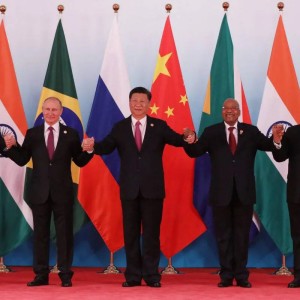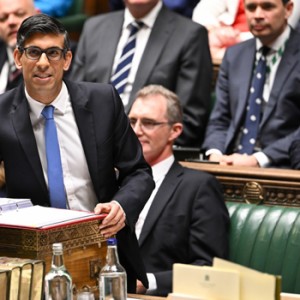On Friday, Polish Prime Minister Donald Tusk also recommended not getting too worried over the Russian leader’s remarks.
“I would not attach excessive importance to the latest statements from President Putin,” Tusk told a news conference. “They rather show the difficult situation the Russians have on the front.”
Throughout the war, Kremlin and senior Russian officials have spelled out a series of red lines, for example the supply of F-16 warplanes to Kyiv or any invasion of Russian territory, and these have been crossed without major repercussions.

A Storm Shadow long-range air-launched cruise missile displayed by European missile maker MBDA at the Farnborough International Airshow 2024 outside London on July 22. (Justin Tallis/AFP/Getty Images)
In addition, until recently Kremlin officials seemed to be playing down the matter, stating that the decision to lift restrictions on using Western weapons for long-range strikes into Russia had already been made.
But on Friday, speaking after the responses from Starmer and Tusk, Kremlin spokesman Dmitry Peskov sought to reinforce the gravity of Putin’s warning in comments to journalists during a regular conference call.
“The statement that Putin made yesterday is very important,” he said. “It is extremely clear, unambiguous and does not allow for any double readings. We have no doubt that this statement has reached its addressees.”
The Russian daily Kommersant also suggested that this time around, Putin is serious. In an article headlined, “Vladimir Putin drew his red line,” Kommersant reported that such strikes would be classified as NATO strikes against Russia.
“Previously, Russian officials, including Vladimir Putin himself, have repeatedly said that NATO countries are directly or indirectly involved in the confrontation between Russia and Ukraine, but this is the first time this topic has been raised so harshly and unequivocally,” Kommersant reported.
The war against Ukraine, planned as a short, sharp operation, has instead turned into a long, bloody war of attrition, which British intelligence recently estimated has cost Russia more than 610,000 soldiers killed or wounded in action.
Ukrainian President Volodymyr Zelensky and other officials have been pressing Washington for months to lift the restrictions against using Western missiles to target military sites such as airfields where Moscow bases the planes that have launched devastating strikes, knocking out much of Ukraine’s energy infrastructure as well as killing civilians.
Biden was asked Tuesday whether the United States was ready to lift the restrictions. “We are working that out right now,” he said.
A British government statement ahead of Friday’s White House meeting accused Russia of escalating the war, notably by importing Iranian ballistic missiles for use against Ukraine, calling it “a significant escalation … bolstering Putin’s capability to continue his illegal war.”
The FSB said expelling the six diplomats is a first step in response to “the numerous unfriendly steps taken by London.” It said it found “signs of spying and sabotage” by the six British diplomats from the political department of the Moscow embassy.
An FSB officer who appeared on state television on Friday morning said British diplomats being expelled had met with journalists from Novaya Gazeta newspaper and from the rights group Memorial.
Memorial, a Nobel Peace Prize laureate, has, like hundreds of media, civil society organizations, journalists and activists, been declared a “foreign agent” by Russian authorities.
“It’s a classical British spy. It’s fun watching him, but it can’t be tolerated any further,” the FSB officer said.
“We got sick and tired of tolerating this circus as they went jogging … across Moscow and through urban forests, their one-day visits to neighboring towns for the purpose of sitting on a bench for several hours in the frost, or multiple changes of public transport and taxis to escape from security services in order to visit some gathering of foreign-agent NGOs that lobby for migrants’ interests,” he said.
State television broadcast the names and photographs of the accused diplomats.
 Washington
Washington















